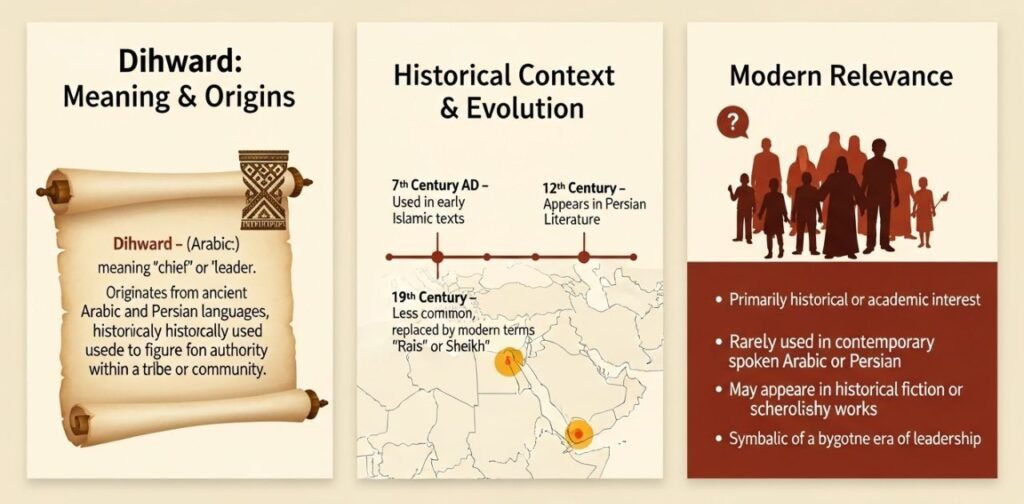What Is Dihward? Understanding the Concept
The word Dihward may sound unfamiliar to many, but it carries both cultural and conceptual weight depending on the context in which it is used. While some associate Dihward with traditional roots or personal names, others see it as a symbolic word representing strength, endurance, and resilience. In today’s globalized world, where cultural terms and names travel quickly across borders, Dihward has gained attention as both a personal identifier and a broader idea connected to heritage and values.
Names and terms like Dihward often emerge from linguistic blends, local dialects, or ancient traditions. In many cultures, names are more than labels—they carry meaning, history, and sometimes even spiritual significance. For example, certain names symbolize courage, leadership, or protection. Dihward resonates in a similar way, reflecting qualities such as determination and stability.
In modern interpretation, people have started viewing Dihward as a concept rather than just a name. It represents the idea of standing firm in one’s identity while adapting to change. This dual quality—resilience with flexibility—is what makes Dihward stand out as a term worth exploring.
Moreover, as societies shift toward rediscovering traditional names and roots, Dihward has become a reminder of how cultural identity and personal meaning intersect. In an age where globalization often blends identities, having terms like Dihward helps preserve individuality and authenticity. It bridges the gap between old traditions and modern lifestyles, ensuring that heritage remains alive in contemporary contexts.
Thus, Dihward is not just a name or term—it’s a symbol of continuity, grounding, and cultural pride. Whether used in personal naming, branding, or cultural storytelling, it carries with it a message of strength and legacy.
Historical and Cultural Roots of Dihward
Names and cultural identifiers like Dihward often trace their roots back to history, where they were shaped by language, geography, and tradition. To understand the cultural essence of Dihward, it’s important to look at how such terms were historically used and preserved.
In many regions, names derived from ancestral languages served as markers of tribal belonging or community identity. They often carried symbolic meanings—protecting spirits, guiding values, or reflecting natural elements like the sun, river, or earth. Dihward, in this sense, can be interpreted as part of this larger heritage of meaningful naming.
Historical records suggest that names resembling Dihward were common in societies where personal identity was closely tied to strength and endurance. Leaders and protectors often bore names symbolizing resilience. Over generations, these names were adapted, re-spelled, or transformed by language evolution, but their essence remained intact.
The cultural roots of Dihward also highlight its connection to storytelling traditions. In many communities, names weren’t random choices but rather reflections of family history, values, or even visions experienced by elders. Dihward could easily fit into this framework, symbolizing someone destined to withstand challenges or bring stability to others.
In a broader cultural sense, Dihward reflects the universal human desire to leave a legacy. Just as families pass down heirlooms, so too do they pass down meaningful names. A name like Dihward carries the weight of history, reminding people of where they come from and encouraging them to stay true to their values.
As modern society becomes more fast-paced, terms like Dihward remind us of the importance of heritage. They stand as anchors in a constantly changing world, linking individuals to their past while guiding them into the future.
Dihward in Modern Contexts: Identity and Symbolism
In today’s interconnected world, Dihward is more than a cultural or historical artifact—it has transformed into a modern symbol. With growing interest in personal branding, unique names, and cultural identity, Dihward stands as a term that bridges tradition with modern relevance.
On a personal level, many people adopt names like Dihward to assert individuality. Unlike common or globalized names, unique identifiers set people apart, giving them a sense of distinctiveness. At the same time, such names connect them to deeper meanings, often tied to strength, stability, and heritage.
In branding and creative industries, Dihward can be used as a powerful symbolic element. Brands often search for names that carry depth and uniqueness—something memorable and culturally resonant. A term like Dihward, with its undertones of resilience and authenticity, fits perfectly into industries that value originality. Whether for clothing, lifestyle products, or even artistic projects, Dihward carries an aura of strength and elegance.
Dihward also resonates in discussions of identity. In an era where people are reclaiming their roots and re-establishing cultural pride, meaningful terms serve as tools of empowerment. Using Dihward in modern contexts reflects a commitment to authenticity, reminding individuals to remain grounded while embracing change.
Furthermore, the symbolic power of Dihward lies in its dual nature—it is both deeply rooted in tradition and highly adaptable to contemporary needs. This makes it appealing for those seeking balance between heritage and modernity. It stands as a reminder that progress doesn’t have to erase the past; rather, it can build upon it.
Thus, whether used as a personal name, a cultural symbol, or a creative identity, Dihward holds significant value in the modern world. It encapsulates the timeless human need for belonging while encouraging individuals to shape their own path forward.
Why Dihward Matters in Today’s Global Culture
In a world where globalization often blurs cultural boundaries, Dihward emerges as an important reminder of the power of individuality and heritage. Its significance lies not only in its historical roots but also in how it resonates with modern values.
One key reason why Dihward matters today is its connection to identity. People are increasingly seeking to rediscover their roots, and names or concepts like Dihward serve as cultural anchors. They provide a sense of belonging, especially in multicultural societies where individuals may feel disconnected from their heritage.
Another reason is the emphasis on uniqueness in modern culture. From business branding to personal social media presence, having a distinct identity is more valuable than ever. Dihward embodies this uniqueness, making it relevant for individuals and organizations alike.
Dihward also aligns with global movements toward authenticity and sustainability. Just as people are turning to natural materials, ethical practices, and traditional crafts, they are also seeking authentic cultural symbols. Dihward fits within this trend, offering a name or idea that feels rooted, genuine, and meaningful.
Furthermore, Dihward reflects the human need for resilience in uncertain times. In a rapidly changing world shaped by technological disruptions, environmental challenges, and social shifts, concepts tied to endurance and stability resonate deeply. Dihward symbolizes the strength to withstand challenges while adapting to change—a quality highly valued today.
Finally, Dihward matters because it represents a fusion of past and future. It connects people to their heritage while giving them a tool to shape modern identity. It’s not limited to one culture or one use—it’s universal, adaptable, and timeless.
Frequently Asked Questions (FAQs)
1. What does Dihward mean?
Dihward is often interpreted as a name or concept symbolizing strength, resilience, and continuity, though its meaning can vary by cultural context.
2. Is Dihward a traditional name?
Yes, it has roots in cultural and linguistic traditions, where names were tied to heritage, values, and symbolism.
3. Can Dihward be used in branding?
Absolutely. Its uniqueness and symbolic weight make it an excellent choice for brands seeking originality and authenticity.
4. Is Dihward still relevant today?
Yes, it has become even more relevant in modern times as people reclaim cultural pride and seek distinct identities.
5. How is Dihward connected to resilience?
Historically, names like Dihward carried symbolic meanings tied to strength and endurance. In modern interpretation, it continues to represent resilience in personal and collective identity.
6. Is Dihward only a name, or does it have broader use?
While it can be used as a name, it also works as a cultural symbol, a branding element, and a philosophical concept tied to authenticity and stability.
7. Why is uniqueness important in choosing a name like Dihward?
Unique names stand out in today’s crowded world, helping individuals and brands create lasting impressions while connecting to deeper meaning.
Conclusion: The Future of Dihward as a Cultural and Modern Symbol
Dihward is more than just a name—it is a cultural and symbolic bridge between past and present. Rooted in heritage and tradition, it has evolved into a modern identity marker that reflects values of strength, authenticity, and individuality. In today’s fast-paced global culture, where people often feel disconnected from roots and overwhelmed by sameness, Dihward emerges as a beacon of resilience and originality.
Looking ahead, the role of Dihward is likely to expand. As more people embrace cultural authenticity, unique names and concepts will continue to gain value. Whether used in personal identity, artistic expression, or branding, Dihward will remain a timeless symbol of heritage and resilience.
Its adaptability ensures that it won’t be confined to history—it will continue to shape future narratives, inspiring individuals and communities to stay rooted while reaching forward. In many ways, Dihward captures the universal human journey: remembering where we come from while courageously shaping where we are going.



